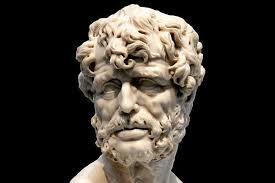
LUCIUS ANNAEUS SENECA is a Roman Stoic philosopher, a statesman and a dramatist. Born in Corduba (Hispania), he grows up in Rome and shows strong interest in rhetoric and philosophy.
When Nero becomes emperor in AD 54, Seneca takes the delicate role of being his advisor. In such a position he ensures a competent government during the first five years of Nero’s ruling. Then the philosopher’s influence over Nero declines progressively. In AD 65, the emperor forces Seneca to commit suicide. The accusation is of complicity in the Pisonian conspiracy concocted in order to assassinate Nero. Nonetheless, the philosopher is probably innocent. His stoic and lenghty suicide later becomes the subject of several high-quality paintings. For instance, Manuel Domínguez Sánchez, The suicide of Seneca (1871), in the Prado Museum.
As an author, Seneca gathers acclamation for his philosophical works and for his tragedies. His writings in prose include a dozen essays and one hundred twenty-four letters dealing with moral issues. These works are among the most significant bodies of primary material for ancient Stoicism.
In his books Seneca often cites Zenon, Kleanthes, and Chrysippos. He also mentions Poseidonios, with whom Seneca shares an interest in natural phenomena. He even quotes Epicurus, especially in his Letters. The motto from his Moral Epistles 48.2 – vivas oportet si vis tibi vivere (“one must live for another, if he wishes to live for himself”) is on the back of the Waldo Hutchins bench (1932) in Central Park, Manhattan, New York City.
The Letters to Lucilius show Seneca’s quest for ethical perfection. Seneca considers philosophy as a medicine for the wounds of life. He suggests to eradicate all destructive passions, in particular anger and grief. He who proves unable to uproot them should at least moderate them according to reason. Seneca says that we must practice poverty and use wealth properly. He also writes about favours, clemency, the importance of friendship, and the need to benefit others. The universe is governed for the best by a rational providence, thus we can only accept the adversities.